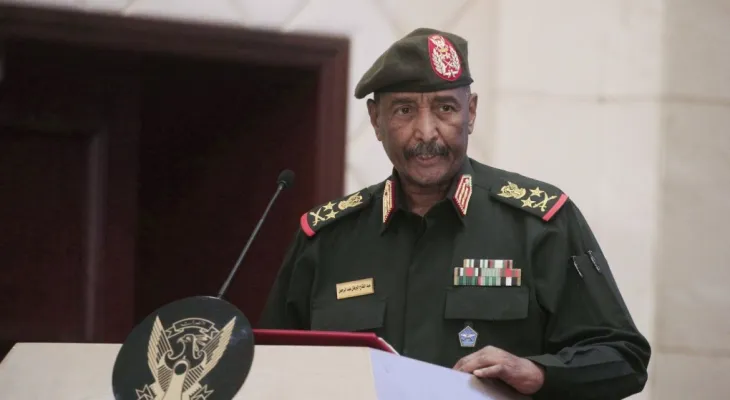Search here
Newspaper
Search here

Arab Canada News
News

Published: July 31, 2024
The Sudanese army stated that Sudanese military leader General Abdel Fattah al-Burhan survived a drone attack on Wednesday during a military graduation ceremony he was attending in the east of the country.
The attack, which resulted in the deaths of five people, is the latest development in the conflict that Sudan has been experiencing since a popular uprising overthrew its longtime leader Omar al-Bashir in 2019. The army added that the drone attack occurred in the town of Jbeil after the ceremony concluded. Al-Burhan was unharmed, according to Major Hassan Ibrahim from the military spokesperson's office.
Videos posted by the Al-Arabiya television network showed several people running on the road during the drone attack, while other footage showed individuals at the graduation ceremony looking up at the sky apparently during the drone strike.
Another video published by the Sudanese Armed Forces on Facebook showed a crowd gathering around al-Burhan after the drone strike, cheering for him as he smiled.
The post stated, "An impromptu popular gathering of the residents of the Jbeil area with the President of the Sovereignty Council and the Commander-in-Chief following the graduation of a new batch of officers."
Sudan has been torn apart by war for over a year between the army and a powerful paramilitary group, the Rapid Support Forces (RSF). With fighting in the capital Khartoum, the military leadership is largely operating from eastern Sudan near the Red Sea coast.
The RSF has not yet commented on the assassination attempt, which comes nearly a week after their leader stated that he plans to attend ceasefire talks in Switzerland next month arranged by the United States and Saudi Arabia.
General Mohamed Hamdan Dagalo, head of the RSF that is fighting the Sudanese army, at the time confirmed that the talks would become a "key step" towards peace and stability in Sudan and the establishment of a new state based on "justice, equality, and federal governance."
The Sudanese Foreign Ministry responded on Tuesday to the U.S. call for talks in Geneva, stating that the army-controlled Sudanese government is ready to participate but emphasized that any negotiations before the implementation of the Jeddah Declaration "would not be acceptable to the Sudanese people."
The Jeddah Declaration on the commitment to protect civilians issued last year aimed to end the conflict, but neither party has adhered to its objectives.
Representatives from the Sudanese army and the RSF led by Mohamed Hamdan Dagalo engaged in renewed talks mediated by the United States and Saudi Arabia in Jeddah, focusing on the delivery of humanitarian aid, achieving a ceasefire, and paving the way for a permanent cessation of hostilities, among other goals.
In its statement on Tuesday, the Sudanese Foreign Ministry accused the RSF of being the sole party attacking cities, towns, and civilians. The army-controlled Sudanese government demanded sanctions be imposed on "the rebels to stop their ongoing aggression and end their siege of cities and open roads."
The statement asserted, "The participants in the initiative are the same parties that participated in the Jeddah talks, and the topics are identical to what was agreed upon."
The ministry added that the military-led government must be consulted regarding the planned agenda for any negotiations and the parties involved, with the provisions of the Jeddah Declaration considered the basis for future talks.
Cameron Hudson, former chief of staff to the U.S. special envoy to Sudan, stated that the military government's response is "more positive and open" than expected as it opens the door for preliminary talks with the United States.
The RSF was formed from Janjaweed fighters created during the era of former Sudanese President Omar al-Bashir, who ruled the country for three decades before being overthrown during a popular uprising in 2019. He is wanted by the International Criminal Court on charges of genocide and other crimes during the Darfur conflict in the early 2000s.
According to the UN migration agency, more than 4.6 million people have been displaced as a result of the conflict. This includes over 3.6 million who have fled to safer areas within Sudan and more than a million others who have crossed into neighboring countries. More than 285,300 people have fled to Egypt.
Comments